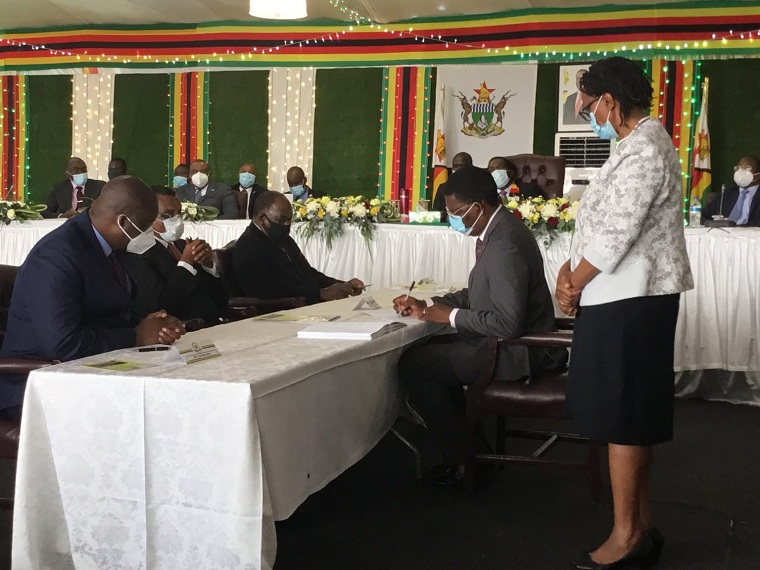 In a development described by President Emerson Mnangagwa as an “extraordinary milestone” in the history of public sector management in Zimbabwe, permanent secretaries today signed performance contracts which will be used to gauge their efficiency as heads of ministries.
In a development described by President Emerson Mnangagwa as an “extraordinary milestone” in the history of public sector management in Zimbabwe, permanent secretaries today signed performance contracts which will be used to gauge their efficiency as heads of ministries.
Speaking at the signing ceremony, Mnangagwa said the new system was envisaged to result in robust public sector institutions and a leadership that was results focused.
“The Second Republic is about action and results and all our activities should be streamlined accordingly to make positive and lasting impacts for the growth of our economy and overall improved quality of life for our people,” he said.
“A performance contract is a tool we have opted for as government. This is a negotiated performance agreement between government, acting as the owner of an agency and the permanent secretary acting as the management of the agency. It specifies what needs to be achieved, expected levels of achievement, timelines and reporting modalities.
“The performance contract organises and defines tasks so that management can perform them systematically, purposefully and with reasonable probability of achievement thereby making it possible to measure the performance of a public institution, the performance of the manager and the performance of the government.”
Mnangagwa said benefits of performance contracting included improved efficiency in service delivery by ensuring that holders of public offices are held accountable for results, ensuring that performance and results link with stakeholder expectations and enhancing good governance.
He said subjecting the permanent secretaries to performance contracts was also in line with the Constitution.
“We thus have a constitutional obligation to be performance driven and results oriented. In pursuit of this constitutional requirement and also driven by the desire to deal effectively with the traditional problems of bureaucratic lethargy, my government is implementing various economic and governance reforms to strengthen performance management throughout the public sector. Bureaucracy and old ways of doing business and resolving problems have no place under the Second Republic.”
Explaining how the system would work, Mnangagwa said he had put in place a co-ordination architecture, comprised of three Apex agencies which are the Office of the President and Cabinet, the Public Service Commission (PSC) and the Ministry of Finance and Economic Development.
He said this architecture was known as the Tripartite High Level Forum on Public Sector Reforms and Management.
“The Tripartite has well defined roles as follows: The chief secretary to the President and Cabinet will provide the overall policy and strategic direction to the entire government machinery, the chairman of the Public Service Commission will ensure that the requisite human resources strategy to achieve vision 2030 is in place and the secretary for Finance and Economic Development will provide the necessary resources to execute NDS1 in conformity with the programme based budgeting and other fiscal policy provisions,” he said.
“As we implement this reform measure, special attention will be given to the key success factors such as mindset change and joint programming between ministries. The achievement of vision 2030 is predicated on government undertaking of various public sector reforms to re-engineer and re-invigorate its institutions, systems and processes, performance contracting is thus one of the cocktails of reform measures we continue to undertake.”
Going forward, he said cabinet ministers and heads of parastatals would also be subjected to performance contracts.
“Performance contracts will also be extended to heads of parastatals and state enterprises as well as local authorities in view of the devolution agenda that seeks to promote the development of provincial economies.
“As we move forward, this process will be elevated to include cabinet ministers in line with the whole government approach to programming,” he said.-New Ziana
(206 VIEWS)


